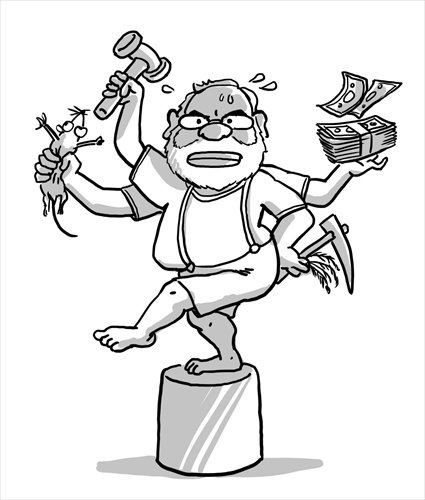Modi more pragmatist than nationalist

Illustration: Liu Rui/GT
Narendra Modi was appointed as the new prime minister of India, the world's largest democracy Tuesday, after a historic landslide victory by him and the Bharatiya Janata Party (BJP) in the 2014 India general election. However, concerns about Modi's ultra-nationalist stance have been strong.
With the BJP securing 316 seats and the Congress party receding as a distant second with just 42 seats in the Lok Sabha, a general election in India has not seen a victory of this scale in decades. This makes concerns about Modi's nationalism more real since he will be able to set his own agenda rather than accommodating the parochial interests of coalition parties.
While the concerns are fair considering Modi's tough rhetoric on a series of issues, the political landscape of India indicates that the new prime minister will stick to pragmatism rather than nationalism.
Take his possible policy options toward Pakistan and China. A resolution of the Kashmir issue is unlikely to come in near future. But with a slow rapprochement, Indian attitudes toward Pakistan may undergo a change.
In 2001, India reacted by a massive military mobilization along the Indian-Pakistani border after an attack on the Indian parliament. In 2008, however, New Delhi stayed largely calm by constraining itself from a confrontation with Islamabad after the Mumbai terrorist attacks. Instead, India insisted that it would continue to talk to Pakistan and to push the process of bilateral trade and normalization. And there has been no major crisis since 2008.
Some argue that China could accelerate India's strategic evolution. But recent progress in bilateral relations has softened such expectations by China acknowledging India's concern for a greater international role and displaying a willingness of coexistence and cooperation with India.
India's confidence in future great power status comes from its population, size and history, but also its growing military and nuclear capability, and a booming economy. Destabilizing the relationship with Pakistan and China would consume a larger share of such resources.
There is not much information about Modi's foreign and security policy platforms. Judging by his campaign rhetoric, he just affirms that the essence of former BJP prime minister Atal Bihari Vajpayee's strategic legacy will be upheld.
As a matter of fact, judging by this statement, we can see more continuities than changes in the shift of power from Congress to the BJP.
Some 15 years ago when Vajpayee returned to power after his brief-lived first government, people expected him to accelerate change by making a shift toward a more robust realpolitik approach to foreign policy.
But the fact is Vajpayee made a rapid decision only on nuclear tests, a decision that previous Congress governments had been heading steadily toward. The other changes he brought in his administration were less substantial than they might first have appeared.
When Congress took power again, Manmohan Singh chose a platform largely similar to Vajpayee's. Singh continued Vajpayee's nuclear reconciliation with the US and even risked his government ratifying India-US nuclear deal, a legacy he inherited from the Vajpayee administration.
The strategy of engagement with great powers and an emphasis on the economic integration of the subcontinent were upheld and enhanced.
To quote US writer Mark Twain, "history does not repeat itself, but it does rhyme." There is no need to stress that Modi will bring new air to India's grand strategy. It would be safer to predict continuities rather than radical changes.
What direction Indian foreign policy will go has yet to be seen. But in a general sense, as a mature power, India will take a pragmatic combination of idealism and realism, to match specific foreign policy goals with corresponding means.
What can work as an indicator for such predictions is Modi's posture during his campaign when he started to distance himself from the most radical element of the party and assured voters that while he is a proud Hindu nationalist, his priority is "toilets first, temples later."
That is a fairly down-to-earth goal. Modi has positioned himself as a pragmatic technocrat, focusing his election campaign on reviving India's stagnant economy, cleaning up a corrupt government, and a tough stance on national security. Domestic front will be his touchstone for reviving and furthering Indian momentum on the international stage.
The author is a PhD candidate in the Department of International Relations, Tsinghua University, and currently visiting at the Department of Politics and International Relations, University of Oxford. opinion@globaltimes.com.cn